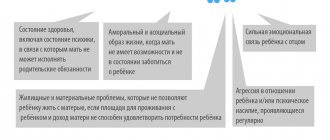Russian legislation (Article No. 63 of the IC of the Russian Federation) clearly states that after divorce, both parents, as during the period of legal relations, have equal legal rights in relation to children. Fathers and mothers are given the same opportunity to participate in the life of the child.
But most men often feel that the father's rights are violated after a divorce. In such a situation, it is strongly recommended that you seek legal advice from an experienced family law attorney.
Paternity rights upon divorce
Parents' awareness of their rights during separation is often low.
Maternal rights are increasingly discussed in the media, but what rights a father has during a divorce are discussed less frequently. In family law there is a concept - physical custody of a child. Mainly associated with physical care of the pupil. This guardianship determines where the child will live. Namely:
- whether the minor family member will live with both parents, spending an equal amount of time in each home;
- whether the child will live with one parent while visiting the other for a certain period of time.
In the case when the child is a teenager, he can decide (at the age of 10) who he wants to live with - with mom or dad. The basis is Article No. 57 of the Family Code of the Russian Federation. This desire can become decisive in establishing the order of communication with the child and determining the place of residence of the offspring in the future.
One parent may have both legal and physical custody, while the other may have visitation rights but not have any custodial rights and therefore will not be able to make decisions that affect the welfare of the minor children.
The rights of a spouse during a divorce should not be violated if the man’s actions are aimed at improving the life of his offspring.
Sunday dad: the moral aspect of the participation of a visiting dad in raising a child
Photo by Pexels It
depends only on the parents how their child will survive the divorce - whether he will perceive the separation of mom and dad as a new stage in life, or whether he will carry deep psychological trauma throughout his life. To minimize the risk of such trauma for a child during a divorce, you should remember the following:
- strictly forbidden to turn a child against his father (mother) . Firstly, it is simply dishonest, and secondly, it is illegal.
- Don't think about settling scores - think about the child. That is, the child’s peace of mind directly depends on building your new relationship.
- Do not allow any quarrels and scandals in front of your child and do not use him in your conflicts. Even if one of the partners makes aggressive attacks, you should remain calm.
- You shouldn't go to extremes either . There is no need to try to compensate a child for a divorce by fulfilling his every whim.
- Find in your new relationship that middle ground that will allow you to take care of your children without having to show up .
- The participation of the visiting father should not be formal - the child should constantly feel the support and attention of the father. This applies not only to holidays, weekends and gifts, but also to daily participation in the child’s life.
- Not every Sunday dad agrees with the visiting schedule determined by his ex-wife - this is interpreted by the man as an infringement of his rights and freedom. But for the mental peace of the child, such a scheme is more beneficial - the child needs stability . Especially in conditions of such a family crisis.
- As for the time that dad should spend with the child , this is an individual question. Sometimes a few joyful days a month spent with dad bring more benefits than Sunday duty.
- The meeting area is also selected based on the situation, relationships and interests of the child.
- Be careful when discussing divorce with your child or with anyone in his presence. You should not speak negatively about the child’s father or demonstrate your feelings - “everything has gone wrong, life is over!” The peace of mind of your child depends on this.
And try to leave your claims and complaints beyond the divorce line. Now you are just partners in raising a child . And only in your hands is the foundation of a strong relationship of support, which, one way or another, will be useful in the future for both of you, and most importantly, for your child.
What can a father demand in a divorce?
Every man who breaks off a legal relationship with a woman should know what rights the father has in the event of a divorce if the children, by mutual consent, remained to live with their ex-wife.
Here are some of them:
- Receive reliable information about the child (health, accidents, his successes and failures).
- Visit a common child at set hours.
- Plan and prepare cultural events held during visiting hours.
- Do not allow the mother to threaten or deprive the father of the opportunity to spend time with the child at the agreed time, on the basis of Art. No. 55 IC RF.
- Call the police if the right to visit joint children is violated, request police reports as evidence, which can later be presented in court.
- Do not give consent for the child and mother to travel to another state, etc.
- Request a change in the divorce decree if the mother, without the consent of the second parent, changes the order of meetings with the child without prior approval.
- Complain about child abuse and violence against them in the family by the mother (provide evidence).
Trips
The next point is the father’s consent for the child to travel abroad. It causes a lot of trouble for mothers whose children want to travel around the world.
The point is that until both parents agree to travel outside the Russian Federation, the child cannot be sent to another country. But here too there are some nuances.
For example, it is not always necessary for ex-wives to obtain consent to take their child abroad. If a child travels as a tourist, you can do without paternal approval.
Moreover, the ban must have grounds. Any family lawyer will warn that the child’s mother can obtain permission to leave the country through the court. Especially if:
- the ban infringes on the interests of the child;
- refusal of permission affects the child’s right to rest.
As practice shows, mothers ask whether the ex-husband agrees to take the child outside the Russian Federation if:
- planning to move for permanent residence;
- I want to leave Russia with my child for a long time.
Important: if the father, with whom the children do not live, decides to secretly take the minors somewhere, this act can be regarded as kidnapping with all the ensuing consequences.
Father's responsibilities and opportunities
Both the rights of the mother and the rights of the father should not be violated during a divorce.
If the father believes that it is better for the child to live with him after separating from his wife, but the ex-wife does not agree, then he will have to apply to the court. The guardianship and trusteeship authorities will conduct a study of living conditions, taking into account the rights of the parents, they will consider the performance of the duties of each of them, personal qualities, financial situation and much more. Namely:
- the ability of any parent who requires the child to live at his place of residence to satisfy his basic needs;
- the ability to provide a minor family member with good living conditions, loving relationships, and a decent upbringing. Here we consider whether the wife or husband has addictions, immoral behavior, etc.
- age of the child;
- mental and physical health of both parents;
Next, a court decision will determine the further place of residence of the pupil, based on the interests of the child. During the trial, a written agreement between the parties may be drawn up about how and when one of the parents will communicate with the child.
Who should the child stay with after divorce?
There are two opposing stereotypes in the mass consciousness:
- Some believe that the child will remain with the mother in any case, since the courts believe that only a woman can provide him with normal care and the “home environment” necessary for normal development
- Others believe that a father with material resources and social influence will always find a way to “take” a child away from a woman
In practice, none of these statements can be considered one hundred percent true. As a matter of law, neither parent is initially the “priority owner” of the child. In each individual case, the decision is made by the court individually, taking into account specific factors.
Another thing is that this is not so easy to do if each parent “pulls the blanket over himself.” And this is, alas, not uncommon during a divorce through the court. In such cases, children serve as a kind of “leverage of pressure” on the opposite side in order to achieve the most favorable terms of divorce for themselves or simply to hurt the ex-husband or wife more painfully.
Changing a child's surname
There are situations when a mother may express a desire to change the child’s last name to another, after remarriage or simply out of anger at her ex-husband. This decision is made by both parents together. Let's face it, there are rare cases when a father in his right mind can agree to this.
Exceptional cases:
- Deprivation of parental rights.
- Declared missing.
- Recognition of incapacity.
The procedure for changing a child’s surname is not one that infringes on the father’s rights during a divorce with the mutual consent of both parents. Permission to change a surname is asked from a student who has reached the age of ten.
Changing personal data
The termination of a marriage often entails a change in the mother's surname. To avoid problems with confirming relationship with a child, there is a need to change the surname for a minor.
If the mother makes decisions about herself independently, then changing the data on the child requires the consent of the father. This is ensured through the submission of a joint application by the parents.
If he disagrees, the father has the right to refuse to sign the application, forcing the mother to keep the baby’s last name unchanged.
When rights may be limited
Men are often interested in the question of what rights a father has after a divorce, in what cases they can be limited, and where this issue is resolved. Such nuances can only be resolved in court.
Restrictions are adopted by a court decision:
- they relate to the schedule for further communication between the father and the children, with a clear indication of the time period of these meetings and location. For example, only on Saturdays from 14.00 to 20.00 on the territory of a man.
- they involve infringement of the father’s rights to the child, after proven gross violations against the child.
Kidnapping
When wondering what rights a father has after a divorce, some men may assume that they can simply steal a child from their mother, and with impunity. This is a big misconception. In Russian legislation there is no concept of stealing one’s own child, but often fathers who do not agree with the court’s decision on the cohabitation of mother and child may decide to keep the child by force. It is very difficult for women to resist such actions.
Recently it was proposed to establish a type of criminal liability for family kidnapping. Legislators propose to fine the parent in the amount of 50,000 rubles for the first abduction. If this happens again, it is proposed to prosecute under Article No. 126 of the Criminal Code of Russia (“Kidnapping”).
Neither the rights of the mother nor the rights of the spouse should be infringed during a divorce. Every parent has the right to continue to communicate with their child legally. If a child remains with the mother, then she should not interfere with the father’s meetings with the baby or teenager. Psychologists say that after a parent’s divorce, a child feels a real loss, a change from a familiar life to an unknown one. The rights of parents after divorce always smoothly turn into responsibilities. The main goal of mom and dad should be care, attention and love for their own child. It is important, even in the most difficult situation, to maintain common sense and direct all efforts to improve the child’s living conditions.
How to resolve a dispute about children during a divorce - a lawyer answers
Divorce in most cases is not a pleasant event. The painful situation can become even more complicated if the spouses have common minor children. The most common questions faced by many couples on the verge or stage of divorce are answered by the managing partner of the Law and Family Mediation law office, lawyer, mediator Elena Zhdanovich.
The couple have not been living together for several years, but are still officially married. We decided to get a divorce. Which court should they submit documents to if they live in different cities? Does it depend on who initiates the divorce? Is there a difference if minor children live with one of the spouses?
The general rule of jurisdiction applies: the claim is filed at the place of residence of the defendant. If minor children live with the plaintiff, then the claim for divorce can also be filed at the plaintiff’s place of residence, i.e. the one who initiated the divorce.
What documents must be submitted to the court and what fee will have to be paid?
The court must submit a statement of claim with a copy for delivery to the defendant, the original marriage certificate, a copy of the personal account (from the place of residence), if there are minor children - copies of the children’s birth certificates, as well as a receipt for payment of the state fee. The state fee for filing a claim for divorce is 4 BV. If a remarriage is dissolved, the state duty is 8 BV.
A dispute arose between spouses who decided to divorce about which parent the minor children would live with after the divorce. What aspects (child’s affection, parents’ financial situation) does the court take into account when deciding this issue?
The court takes into account which of the parents shows more care and attention to the child, the child’s age, attachment to each of the parents, the personal qualities of the parents, the possibility of creating appropriate material and living conditions and a moral and psychological atmosphere, and ensuring an appropriate level of upbringing. If the child has reached the age of 10, then his opinion must be taken into account. In this case, the child’s opinion, at the request of the court, is revealed by the guardianship and trusteeship authority at the place of his residence.
The husband does not agree to the divorce. But life with him is simply impossible: he constantly argues and drinks. Can they get divorced without his consent? There is a minor child in the marriage.
No one can force you to live with a person with whom living with is impossible and unbearable. However, divorce is a specific procedure strictly regulated by law.
When accepting a claim for divorce, the court, in accordance with current legislation, gives the spouses a three-month period to take measures for reconciliation.
During the trial itself, all the circumstances of married life, the possibility and expediency of preserving the marriage are carefully examined, and the fact that there is a minor child in the family is taken into account. If necessary, the court may grant a period of reconciliation within six months. However, if the additional period does not help restore the family, the marriage will be dissolved, despite the lack of consent of the defendant.
My husband and I are divorced. In the statement of claim that the plaintiff filed, there was no request to establish the procedure for communication with the children and the participation of the father in their upbringing. Now the ex-husband insists that the children live with their parents alternately: a week with their mother, a week with their father. The mother is against this order, but agrees that the children periodically spend time (for example, on weekends) with their ex-husband. What should a woman do? Should I go to court again or can the issue be resolved in some other way?
The most important thing in disputes related to the order of parental participation in raising children is that they first of all take into account the interests and needs of their children. The ideal option is to sit down at the negotiating table and decide how the children’s lives will be organized in the new conditions, when parents live separately. If this does not work out, the mother can file a lawsuit to determine the children’s place of residence with her and establish the procedure for the father’s participation in their upbringing.
The husband did not take any part in raising the child. Everything rests on my shoulders. We are currently living separately. Moreover, I do not know his exact place of residence. How to get a divorce in this situation? Is it necessary for a spouse to be present in court? The child is underage.
A claim for divorce can be filed at your place of residence if a minor child lives with you. The application indicates the place of registration of the defendant, your husband, known to you, and his contact information. The court will make efforts to properly notify him of the date of the hearing. If your spouse does not appear at court hearings and the judge is convinced that your family has broken up and it is impossible to save it, the court has the right to decide on divorce. As a rule, in such situations, the courts issue a default judgment, which can be canceled if the defendant proves that he was absent from court for valid reasons and could not inform the court about it in a timely manner.
My husband and I are divorced and have not spoken for a long time. When the marriage was dissolved, he did not raise the question of participation in raising his son. Is his permission now required for his child to travel abroad on vacation?
According to current legislation, a minor child can travel outside of Belarus accompanied by one legal representative, i.e. No second consent is needed. However, if you plan to travel to countries where a Schengen visa is required, the embassies of these countries require the consent of the second spouse to travel. Therefore, it is better to obtain such consent from the father and have it certified at a notary office.
It is known that a husband cannot file for divorce if his wife is pregnant or their joint child is not yet 3 years old. Does this rule apply if an accident occurs and the child dies at this age?
According to Art. 35 of the Code on Marriage and Family (KoBC), divorce is unacceptable during the wife’s pregnancy and before the child reaches the age of 3 years without the written consent of the other spouse to divorce, provided that he lives with the child and provides parental care for him, for except in cases where paternity of the child is recognized by another person or by a court decision, information about the husband as the father of the child is excluded from the record of the child’s birth.
Accordingly, this rule will not apply in the event of the death of a child.
Is a man obliged to support his ex-wife if she agreed to divorce while pregnant or having a child under 3 years of age? After all, the woman is on maternity leave and, in fact, cannot support herself.
According to Art. 30 CoBS, a former spouse in need of financial assistance retains the right to receive maintenance from another former spouse who has the necessary means for this:
- until the common child reaches 3 years of age, if he (she) cares for this child;
- until the common disabled child reaches 18 years of age, if he (she) is caring for this child;
- for the period of caring for a common disabled adult child.
An ex-wife in need of financial assistance retains the right to receive maintenance from her ex-husband, who has the necessary means for this, during pregnancy, if the pregnancy occurred before the divorce.
At the same time, Art. 32 of the CoBC establishes that the court may, taking into account the short duration of the spouses’ marriage or the unworthy behavior of the spouse demanding the payment of alimony, release the other spouse from the obligation to support him or limit this obligation to a certain period.
Also, the right of one spouse to receive maintenance from the other is lost if the conditions that served as the basis for this no longer exist, and also if the divorced spouse receiving maintenance enters into a new marriage. If the funds were collected by a court decision, the spouse obligated to pay them, in the cases provided for by this article, has the right to apply to the court with a claim to exempt him from further payment.
How is the issue of alimony resolved if, as a result of divorce, one child remains with the mother, and the second with the father?
In accordance with Art. 91 KoBS, parents are obliged to support their minor children. If they do not provide maintenance to their minor children, alimony is collected from the parents in court.
According to Art. 92 CoBS, if children remain with each of the parents, alimony from one of them in favor of the other, less wealthy, in the absence of an agreement on children, an agreement on the payment of alimony, and also if the amount of alimony is not determined by the marriage contract, is established in a fixed monetary amount, collected monthly and determined by the court in relation to the amounts established by this article, taking into account the financial and marital status of the parents.
What surname will the child have after his parents divorce? Can the mother apply to change his last name?
Art. 70 of the Code of Laws of Ukraine stipulates that the termination of a marriage between parents or its recognition as invalid does not entail a change in the child’s surname.
If the parent with whom the child remained to live after the termination of the marriage or its recognition as invalid or after entering into a new marriage, wants to assign his surname to him, the guardianship and trusteeship authority has the right to allow this based on the interests of the child.
Changing the surname of a child who has reached 10 years of age is in all cases made with his consent, which is obtained by the guardianship and trusteeship authorities.
The parent whose last name the child bears is notified of the filing of a petition to change the child’s last name, and his opinion, along with other circumstances, is taken into account by the guardianship and trusteeship authorities when resolving this issue.
Upon a joint application of the parents of a child under 16 years of age, the guardianship and trusteeship authority has the right, based on his interests, to allow the change of the surname assigned to him to the surname of the other parent, unless otherwise provided by this Code.
You have a child together with a foreign citizen. Until recently, the whole family lived abroad, in the spouse’s homeland. I was forced to leave there because living together became impossible. How to get a divorce if your spouse does not agree to it? How to resolve the issue of my son’s residence? I think that the child will be better off with me. The husband threatens to take his son away.
As a general rule, an application to initiate a case is filed with the court at the defendant’s place of residence. However, it is possible to file for divorce in Belarus. According to Art. 231 CoBC, in the republic, the dissolution of marriages of Belarusians with foreigners, at least one of whom has a permanent residence permit in our country, is carried out in accordance with the legislation of Belarus. For example, a claim against a defendant whose place of residence is unknown or who does not have a place of residence in Belarus may be brought at the location of his property or at his last known place of residence in the republic. Also, a claim for divorce can be brought at the place of residence of the plaintiff, when he has minor children with him or when, for health reasons, the plaintiff’s travel to the defendant’s place of residence seems difficult for him.
Divorce is carried out by the court according to the procedure of claim proceedings. When accepting a claim for divorce, the court gives the spouses a three-month period to take measures for reconciliation, as well as to reach an agreement on common minor children and division of property. After this period, the marriage is dissolved if the court finds that the spouses’ further life together and the preservation of the family have become impossible. When considering a claim, the court takes measures aimed at preserving the family and has the right to postpone the hearing of the case, assigning the spouses an additional period for reconciliation within six months.
Thus, the disagreement of one of the spouses to divorce may become a reason for granting an additional period for reconciliation, but not a basis for refusing to dissolve the marriage.
To resolve the issue of the son’s residence, it is necessary to submit a request to the court to determine the child’s place of residence. In accordance with Art. 74 KoBS, the child’s place of residence is considered to be the place of residence of his parents. In this case, the place of residence of the child in the event of separate residence of the parents due to divorce or for other reasons is determined by mutual consent of the parents. Their disagreements on this matter are resolved in court based on the interests of the child.
When resolving a dispute about a child’s place of residence when parents live separately (at different addresses) (regardless of whether they are married), the court takes into account his age, attachment to each of the parents, brothers, sisters, other family members, moral and other qualities of parents. The relationship that has developed between each parent and the child, the degree of care and attention shown to him by the parents, taking into account their type of activity, work schedule, and other living conditions are taken into account. The possibility of each of them providing appropriate material and living conditions for the upbringing and development of the child, as well as other circumstances prevailing in the place of residence of each of the parents, is assessed.
In addition, in this situation it is necessary to take into account the fact that the father has citizenship of another country. If the spouse repeatedly threatens to take the child away, then this is a reason to fear the illegal removal of the child from Belarus. In accordance with Art. 12 of the Law “On the procedure for departure from the Republic of Belarus and entry into the Republic of Belarus of citizens of the Republic of Belarus”, if one of the legal representatives does not agree with the procedure for departure from the Republic of a minor provided for by this law, he may apply to the court to determine otherwise procedure for leaving the country. In this regard, it is also necessary to submit demands in court to determine otherwise, namely, only with the consent of the mother, the procedure for the minor son’s departure abroad.
He married a woman with a child from his first marriage and adopted him. After several years of marriage they decided to get a divorce. Can an adoption be canceled to avoid paying child support?
According to Art. 138 KoBS, the adoption of a child can be canceled if the adoptive parents:
- recognized as incompetent or partially capable;
- are patients with chronic alcoholism, drug addiction, substance abuse;
- avoid raising and (or) maintaining a child;
- abuse parental rights and (or) abuse an adopted child;
- cannot fulfill parental responsibilities due to the presence of a disease included in the list provided for by the Decree of the Ministry of Health of March 30, 2010 No. 36 “On approval of the list of diseases for which parents cannot fulfill parental responsibilities”;
- lead an immoral lifestyle, which has a harmful effect on the adopted child.
The adoption of a child may also be canceled in other cases provided for in part one of Article 125 of this Code (when the adoption itself was illegal), if this is necessary to protect the rights and legitimate interests of the child. In this case, the wishes of the child who has reached ten years of age must be taken into account.
Thus, it is quite difficult to cancel an adoption.
The ex-husband filed a claim to establish the order of communication with a young child. Among other things, he indicated a request to allow him to take his son abroad every year on vacation. His wife is against this point, although in general she approves of his desire to participate in raising his son. Can a wife somehow prohibit her husband from traveling abroad with his child?
All questions about the forms and methods of raising children, their education, attitudes towards religion, organization of free time and others are decided by both parents by mutual agreement.
Disagreements between parents regarding issues of raising children are resolved in court. In such claims, the court, taking into account the specific circumstances, must determine how often the parent will communicate with the children (number of meetings per month, per week, on weekends), in what place (in the mother’s, father’s house, at school, in kindergarten, etc.) etc.) and for how long (a day, a day, several hours, for the period of parental leave, etc.). In this case, the age of the children, state of health, attachment to each of the parents and other circumstances that can have an impact on the physical and mental health of the children and their moral development are taken into account.
In accordance with Art. 60 of the Civil Procedure Code, the defendant has the right to defend against the brought claim. He can formulate his position in objections to the claim or file a counterclaim. The position must be argued from the point of view that the communication procedure declared by the plaintiff does not correspond to the interests of the child, violates his daily and rest schedule and, possibly, will harm the child’s health. Restrictions on the father and child traveling abroad on vacation must also be motivated and supported by evidence (medical certificates, etc.).
Can the court help his grandparents (mother and father of the ex-husband) get permission to see the child? The fact is that after a divorce, the ex-wife is forced to allow her ex-husband to communicate with the child. As for participation in the upbringing of grandparents, this issue has not been resolved. Now my wife is categorically against such meetings, not considering them necessary.
In accordance with Art. 185 KoBS, all children have the right to live in a family surrounded by parents and close relatives, to their care and attention.
According to Art. 78 KoBS, grandparents have the right to communicate with their grandchildren. If the parents, guardians, or custodians of the child refuse to provide the grandparents with the opportunity to communicate with their grandchildren, the procedure for communication is determined by the court.
According to BELTA








